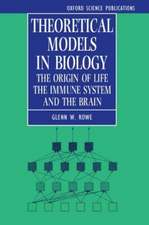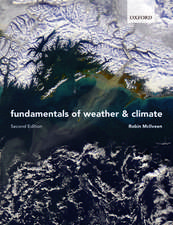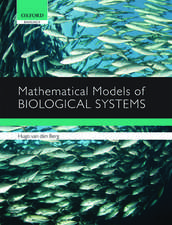Thermodynamics of Materials with Memory: Theory and Applications
Autor Giovambattista Amendola, Mauro Fabrizio, John Murrough Goldenen Limba Engleză Hardback – 21 oct 2021
This monograph deals with the mechanics and thermodynamics of materials with memory, including properties of the dynamical equations that describe their evolution in time under varying loads. A work in four parts, the first is an introduction to continuum mechanics, including classical fluid mechanics, linear and non-linear elasticity. The second part considers continuum thermodynamics and its use to derive constitutive equations of materials with memory, including viscoelastic solids, fluids, heat conductors and some examples of non-simple materials. In the third part, free energies for materials with linear memory constitutive relations are discussed. The concept of a minimal state is introduced. Explicit formulae are presented for the minimum and related free energies. The final part deals with existence, uniqueness, and stability results for the integrodifferential equations describing the dynamical evolution of viscoelastic materials, including a new approach based on minimal states rather than histories. There are also chapters on the controllability of thermoelastic systems with memory, the Saint-Venant problem for viscoelastic materials and on the theory of inverse problems.
The second edition includes a new chapter on thermoelectromagnetism as well as recent findings on minimal states and free energies. It considers the case of minimum free energies for non-simple materials and dielectrics, together with an introduction to fractional derivative models.
| Toate formatele și edițiile | Preț | Express |
|---|---|---|
| Paperback (2) | 711.21 lei 6-8 săpt. | |
| Springer Us – 25 ian 2014 | 711.21 lei 6-8 săpt. | |
| Springer International Publishing – 22 oct 2022 | 970.87 lei 6-8 săpt. | |
| Hardback (1) | 976.20 lei 6-8 săpt. | |
| Springer International Publishing – 21 oct 2021 | 976.20 lei 6-8 săpt. |
Preț: 976.20 lei
Preț vechi: 1190.48 lei
-18% Nou
Puncte Express: 1464
Preț estimativ în valută:
186.85€ • 203.03$ • 157.06£
186.85€ • 203.03$ • 157.06£
Carte tipărită la comandă
Livrare economică 21 aprilie-05 mai
Preluare comenzi: 021 569.72.76
Specificații
ISBN-13: 9783030805333
ISBN-10: 3030805336
Ilustrații: XXI, 755 p. 11 illus.
Dimensiuni: 155 x 235 mm
Greutate: 1.33 kg
Ediția:2nd ed. 2021
Editura: Springer International Publishing
Colecția Springer
Locul publicării:Cham, Switzerland
ISBN-10: 3030805336
Ilustrații: XXI, 755 p. 11 illus.
Dimensiuni: 155 x 235 mm
Greutate: 1.33 kg
Ediția:2nd ed. 2021
Editura: Springer International Publishing
Colecția Springer
Locul publicării:Cham, Switzerland
Cuprins
Part I: Continuum Mechanics and Classical Materials.- Introduction to Continuum Mechanics.- Materials with Constitutive Equations That Are Local in Time.- Part II: Continuum Thermodynamics and Constitutive Equations of Mechanics and Electromagnetism.- Principles of Thermodynamics.- Free Energies and the Dissipation Principle.- Thermodynamics of Materials with Memory.- Thermoelectromagnetism of Continuous Media.- Part III: Free Energies for Materials with Linear Memory.- A Linear Memory Model.- Viscoelastic Solids and Fluids.- Heat Conductors.- Free Energies on Special Classes of Material.- The Minimum Free Energy.- Representation of the Minimum Free Energy in the Time Domain.- Minimum Free Energy for Viscoelastic Solids, Fluids, and Heat Conductors.- The Minimum Free Energy for a Continuous-Spectrum Material.- The Minimum Free Energy for a Finite-Memory Material.- Free Energies for the Case of Isolated Singularites.- Constructing Free Energies for Materials with Memory.- MinimalStates and Periodic Histories.- Second Order Approximation for Heat Conduction: Dissipation Principle and Free Energies.- Free Energies for Nonlinear Materials with Memory.- Free Energies for Nonlocal Materials.- The Minimum and Related Free Energies for Dielectric Materials.- Fractional Derivative Models of Materials with Memory.- Part IV: The Dynamical Equations for Materials with Memory.- Existence and Uniqueness.- Controllability of Thermoelastic Systems with Memory.- The Saint-Venant Problem for Viscoelastic Materials.- Exponential Decay.- Semigroup Theory for Abstract Equations with Memory.- Identification Problems for Integrodifferential Equations.- Dynamics of Viscoelastic Fluids.- Conventions and Some Properties of Vector Spaces.- Some Properties of Function on the Complex Plane.- Fourier Transformations.
Textul de pe ultima copertă
This monograph deals with the mechanics and thermodynamics of materials with memory, including properties of the dynamical equations that describe their evolution in time under varying loads. A work in four parts, the first is an introduction to continuum mechanics, including classical fluid mechanics, linear and non-linear elasticity. The second part considers continuum thermodynamics and its use to derive constitutive equations of materials with memory, including viscoelastic solids, fluids, heat conductors and some examples of non-simple materials. In the third part, free energies for materials with linear memory constitutive relations are discussed. The concept of a minimal state is introduced. Explicit formulae are presented for the minimum and related free energies. The final part deals with existence, uniqueness, and stability results for the integrodifferential equations describing the dynamical evolution of viscoelastic materials, including a new approach based on minimal states rather than histories. There are also chapters on the controllability of thermoelastic systems with memory, the Saint-Venant problem for viscoelastic materials and on the theory of inverse problems.
The second edition includes a new chapter on thermoelectromagnetism as well as recent findings on minimal states and free energies. It considers the case of minimum free energies for non-simple materials and dielectrics, together with an introduction to fractional derivative models.
Caracteristici
This is the first comprehensive treatment in book form of free energies of materials with memory This is the first systematic presentation in book form of a new method of analysis of the evolution equations of viscoelastic materials, using the concept of a minimal state The various new topics included are firmly rooted on a foundation of Continuum Thermodynamics, which is discussed in detail, including a general abstract formulation of the theory Constraints imposed by thermodynamics are extensively used The work is self-contained to a significant degree in that it contains a detailed presentation of Continuum Mechanics and classical theories This is the first systematic treatment in book for of the Saint Venant Problem for viscoelastic materials and of the controllibility of thermoelastic systems with memory Contains new topics in free energy functionals and fractional derivative models Examines explicit forms of free energies in modelling the behavior of material elements
Recenzii
From the reviews:
“Modern technology has evolved many material properties leading to memory for which a unifying description seems impossible. The book under review attempts to provide such a unifying description. It presents detailed accounts on the mechanics and thermodynamics of materials with memory, including properties of the dynamical equations which describe their evolution in time under varying loads. … The book presents a wealth of information on materials with memory and it will attract a wide readership from academia.” (K. N. Shukla, Zentralblatt MATH, Vol. 1237, 2012)
“Modern technology has evolved many material properties leading to memory for which a unifying description seems impossible. The book under review attempts to provide such a unifying description. It presents detailed accounts on the mechanics and thermodynamics of materials with memory, including properties of the dynamical equations which describe their evolution in time under varying loads. … The book presents a wealth of information on materials with memory and it will attract a wide readership from academia.” (K. N. Shukla, Zentralblatt MATH, Vol. 1237, 2012)












